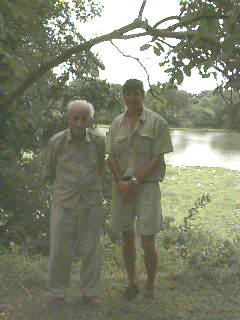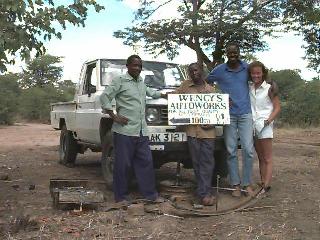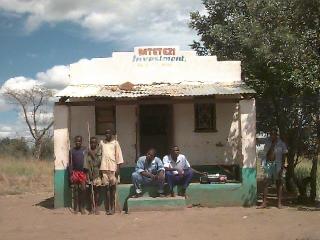|
26 Apr 1996 - Mfuwe, Zambia
"Tell me your story," he says to me. This man is 84 years old. He was born on
an island at the mouth of the Zambezi River in Portuguese Mocambique, and his
name is Norman Carr. I like his tactics. I came here to listen to him, but he
wants to listen to me first. He is weathered and frail, but his eyes are sharp
and his mind is clear. The island he was born on is in the delta. It was a 10
hectare concession to the British with 400 meters of frontage on the Chinde
channel, but it was administered by Nyasaland - so Norman just tells people he
is from Nyasaland. This is where the paddle steamers were harbored, and this is
where they began their journey carrying trade goods up the Zambezi and Shire
rivers to what is now called Malawi. The mission was trying to open trading
stores to stop the slave trade, but then a cyclone wiped out the island. The Luangwa river winds its way from the north - from a land that time forgot. As the current meanders, there are crescent moons of light colored sand revealed along its shores. The level is coming down now, so the hippos and crocodiles are also coming down. When the river is in flood, the current is too swift for them, so they migrate as much as 20 miles up the various tributaries. I ask Norman what the name Luangwa means. "This river has different names at different points," he says. A Kunda man appears and explains that a 'luanga' is a fishing basket for catching fish in the river. "A long time ago people were asking about these baskets, and that is how the river gets its name," he says. There are many hippos in the Luangwa river. This morning, I was awaken by gun fire. Norman explains that they were shooting hippos to take to the Chilanga Zoo outside of Lusaka. "Hippo meat has a rich red color, but it is tough," he says. If you crush a leaf from a papaya tree and then lay it on the top of tough meat for a few minutes, the meat will become tender. There is a peculiar force in this papaya tree. When my friend had an infected leg beneath his plaster cast some years ago, we cut out a piece of the cast and put in some papaya fruit; in less that 12 hours, all of the infection and redness was completely gone. "But you must never leave the papaya leaf on the meat for more that 5 minutes," I am told, "or the meat will become too soft and look like mush." "I am not a philosopher," Norman tells me, "but we must be careful about being anthropomorphic. People talk of nature as if it is a benign force; it is really quite cruel. There is only one thing that matters in nature, and that is survival." Norman came to this part of the world before World War II as an elephant control officer. That was back in the days when there were over 100,000 elephants, and they needed to be controlled. The previous elephant control officer, Charlie Ross, had been killed by an elephant at the foot of the Muchinga escarpment. On his headstone it reads, "Charles Lindsay Ross .... killed by his 850th elephant in Kamwendo's country. 25 May 1936." An elephant was seen at his grave shortly after his death. The Africans have a legend, I am told, about an elephant that comes back to dance on the grave of anyone it has killed. The English Prince Andrew's first exposure to the media at age 18 was with Norman when he was on safari. I am shown a 2$ stamp from the Caribbean island of Nevis which shows Norman and the Prince on safari in Zambia. On it is printed, "1986 Royal Wedding." I am not quite sure what the wedding, the safari, Zambia, Norman, or the island of Nevis have to do with each other, but there is the stamp. There have been a string of Norwegian, Dutch and English princes to visit this part of the world with Norman. The King of Nepal has even been out here, but the Gurka Colonel with a razor sharp Kukri in his belt did not let anyone get near him. "People think that lions are nice," Norman tells me. "When a new male lion takes over a pride, it will kill all the cubs up to one year that are not yet weaned. They are the new dominants and they must pass on their genes. Nature only allows them to be there for a certain time before another male comes along. Otherwise, they would be mating with their own daughters." Norman raised two lions of his own for 4 years in the late 50's. They were called 'big boy' and 'little boy.' "The pecking order is very important," Norman tells me. "In the wild, Lions are the most inefficient hunters of all the predators, but they are the only social hunters in the cat family. Only the strong get to eat. 80% of the young won't survive, because of this pecking order. I used to beat my lions with a stick to teach them about pecking order if they misbehaved." After he released them, they adjusted well to the life of a lion in the bush. "Adaptability is the key to survival in this world," Norman tells me. "Animals are very adaptable." I enjoy meeting people who have spent so much of their lives in the wilderness. They have a quiet and practiced understanding of life. There are yellow baboons on the edge of camp. They come to steal food. I think they are one of my least favorite animals in Africa. The males are cheeky and arrogant. Norman tells me that they are a matriarchal society completely controlled by the females. The new male arrivals throw their weight around, but aggressiveness is not an important factor in their society. These males have to be accepted by the females first. If you look at the older, larger males who have been the longest in residence, they are the ones who know the routine. They are the ones who are accepted by the females, and they are the ones who get the sexual rewards. In Norman's words, "social charm has more beneficial results than aggression." I appreciate Norman's cautions on anthropomorphism, but I can't help but imagine a recent cocktail party. The tse-tse fly is very bad here. There is no cattle. Here the fly carries
trypanosomiasis, or sleeping-sickness. A young woman drives me out through the
bush to "Ranchos Los Pajeros." Her name is Celeste, and she used to be a riding
instructor in England. I think a great journey would be to travel the length of
Africa by horse, but it is impossible, they say, because of the tse-tse fly. Yet
here, amidst a seasonal swamp and towering palms, there are 4 horses, and they
have been here for a year and a half. "The gelding Highdrum has had tryps two
times," Celeste tells me. "The first time was on his 11th day here, then again
on his 239th day here." The symptoms are similar to malaria in humans. This is
why the horse's temperatures are taken and plotted twice a day. "If a horse's
temperature goes up, we draw blood from the ear and take it to the tse-tse
research & control point where they can tell in a few minutes if the horse
is positive or negative." You can tell when they have it, because their skin
looks wet, they have swollen glands in the neck, and their eyes and gums lose
their color from anemia. When they do test positive, they are treated with
Beronil, but the drug can only be used once per month. So far, they have been
fortunate. "We plan to use them for horse safaris," Celeste tells me; "I don't
think anyone has ever had horses in this area before." There is something
impressive about a boldness and initiative - especially when other people say
that it cannot be done. Celeste takes me back to meet her husband Wenceslous Banda. He is named after the good King of Spain who brought the food and wood to the poor. They met in 1992 when Celeste came out on holiday from England. Wenceslous is also a man of initiative. He has opened a motor garage in the bush, but he does not want to build a garage; he wants to keep it bush. He is currently working on Chief Kakumbe's Toyota land cruiser. There are parts spilled all over the sand. "This is the low season," Wenceslous tells me. "I am having one client per day. There are other mechanics, but I am a specialist." It was the chief who gave this land to Wenceslous. He asked for one hectare, and the chief gave him ten. The chief is not around, but I am introduced to the chief's son, Jonathan Kakumbe. He is helping with the work on the land cruiser. I ask Jonathan if he is looking forward to being chief someday, but I am told he will not be. "It is a matriarchal system here," Wenceslous tells me. The yellow baboons come to mind, and I am wondering why everything in Mfuwe seems to be on the matriarchal system. "It is to keep the blood line," I am told. "You see, there is no guarantee that his son is his son. This is why the chief's elder or younger sister's son will become the next chief; the blood line is then certain." I am surprised by this, but it does make very logical sense. There are several chieftanships in the country that do this - like the Chewa, Kunda, Nsenga, Bisa, and maybe the Lala. As Norman drives me down the road to the airport, the grass is towering ten feet along the sides of the road. There are various shops at odd intervals along the road. "This is the problem," Norman says. "This development along the road." We stop at a lone shop on the edge of the road. It is called 'Mtetzi Investment.' Inside there is a well dressed man leaning against the counter listening to a large radio. He is selling soap, batteries, cooking oil, plastic cups, and all sorts of things. I ask him why he calls his shop 'Mtetzi Investment,' and he tells me that all of the products purchased in his shop are an investment in one's future. I can't argue with that, so I order a Fanta. "No, we don't have Fanta," I am told. Norman and I carry on down the road. There are some huts off in the tall grass, and Norman slows down and sounds his horn. I don't get the sense that Norman is prepared to wait very long. A smartly dressed man emerges from a hut and moves quickly to the car. He and Norman greet each other warmly, and he hands Norman a letter to carry to the airport. As we drive off, Norman explains that that was Boniface Zulu, the previous Ambassador to Tokyo. "How times have changed," Norman says. "I came here because the government was worried about elephant overpopulation. Now, with all these villages along the road, I am worried about people overpopulation." I am packing up the plane to leave for the next place. A young lady walks out
to me and says that I must pay landing fees. "Of course, how much are they?" I
ask. "There are different ones," she explains. "What is your destination?" When
the fees start to depend on the destination, I become a little wary. I bring out
my piece of paper, so I can calculate the fees with her; her name is Miss
Sakala. The landing is $2; the parking is $.30 per hour, but the navigation fee
is a formula. "What kind of formula," I ask. "You take the distance to
destination, divided by 100, times the square root of the weight of the
aircraft, divided by 50, times $12," I am told. I really have to pause and
smile. I don't think I have ever heard of a fee like this one. I can't help but
wonder what math student put this fee together; I am still not sure what sort of
a number it can generate. I pull out a calculator, and Miss Sakala and I begin
to calculate.
|





